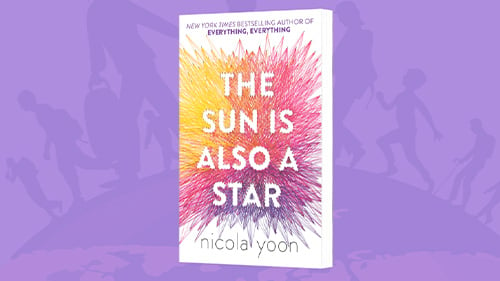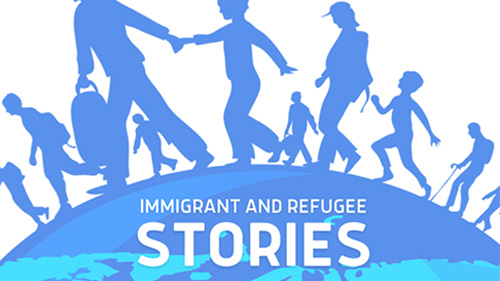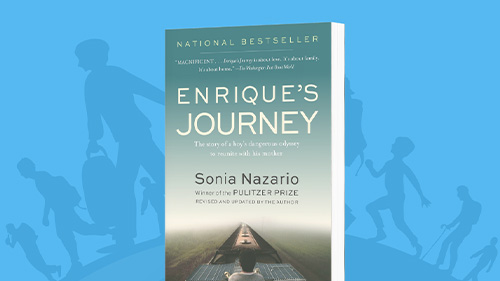Immigrant and Refugee Stories Month: American Street
The best part of my job is the gift of diversity and the stories I get to prompt students to produce in a creative way through narratives, short...
AP & Honors Mathematics
Explore Wiley titles to support both AP and Honors mathematics instruction.
Literacy Skills & Intensive Reading
Connections: Reading – Grades 6–12
Empower student success with a proven intensive reading program that develops strong reading skills in striving readers.
Drama, Speech & Debate
Basic Drama Projects 10th Edition
Build students’ confidence and competence with comprehensive, project-based theatre instruction.
Literature
Connections: Literature
Support learners as they study dynamic, relevant texts and bring the richness of diverse voices to students through literature.
Literature & Thought
Develop critical thinking, reading, and writing across literacy themes, genres, historical eras, and current events.
Language Arts
Vocabu-Lit® – Grades 6–12
Help students build word power using high-quality contemporary and classic literature, nonfiction, essays, and more.
Connections: Writing & Language
Help students develop grammar, usage, mechanics, vocabulary, spelling, and writing and editing skills.
Reading/English Language Arts
Measuring Up to the English Language Arts Standards
Incorporate standards-driven teaching strategies to complement your ELA curriculum.
English Language Learners
Measuring Up for English Language Learners
Incorporate research-based best practices for ELLs with an approach that includes a focus on language acquisition strategies.
Mathematics
Measuring Up to the Mathematics Standards
Incorporate standards-driven teaching strategies to complement your mathematics curriculum.
Foundations
Measuring Up Foundations
Help students master foundational math skills that are critical for students to find academic success.
Science
Measuring Up to the Next Generation Science Standards
Give students comprehensive NGSS coverage while targeting instruction and providing rigorous standards practice.
Assessment
Measuring Up Live
Deliver innovative assessment and practice technology designed to offer data-driven instructional support.
For a better website experience, please confirm you are in:
2 min read
Jennifer Epping Jul 28, 2022 10:30:42 AM

From speaking with students I’ve taught over the past ten years and interviews conducted by my student journalists about Deferred Action for Childhood Arrivals (DACA), immigration, and being undocumented in the U.S., I've learned that getting to America is one journey—staying is another entirely.
In The Sun Is Also A Star by Nicola Yoon, one of the main characters is 17-year-old Natasha Kingsley. Natasha’s family immigrated illegally to the United States and has lived unnoticed for nearly a decade in New York City. After her dad gets a DUI (driving under the influence) and the government discovers their status, Natasha and her family learn they’re being deported back to Jamaica. Only 12 hours remain until her family must leave, but Natasha is desperate to find a solution and stay in the only place she’s ever felt at home.
On her mission to stay, she meets another teen named Daniel, whose parents immigrated long ago from South Korea and who has a knack for writing poetry (and falling in love quickly). Daniel is a U.S. born citizen, but throughout the book pieces of his family’s immigration story unfold. Daniel doesn’t know why Natasha has appointments at an attorney’s office, or why she’s so detached and in a hurry, and he starts to fall in love with her in her final hours in America (unless she can figure out a way to stay, of course).
About 100 pages in, Natasha sets out to meet a lawyer whose reference she got from the immigration office advocate that morning. Almost immediately after entering the office, she’s handed a pile of paperwork to fill out to, once again, tell her family’s story. The perspective is impactful and offers a glimpse into the questions that go through the minds of immigrants.
“On the first form, I answer several variations on the questions of whether I’m a communist, a criminal, or a terrorist and whether I would take up arms to defend the United States…
Another form asks for details about what’s happened in the deportation process so far.
The final form is a client questionnaire that asks me to give a full accounting of my time in the United States. I don’t know what to say. I don’t know what Attorney Fitzgerald is looking for. Does he want to know how we entered the country? How we hid? How it feels every time I write down my fake social security number on a school form? How every time I do, I picture my mom getting on that bus to Florida?
Does he want to know how it feels to be undocumented? Or how I keep waiting for someone to find out I don’t belong here at all?
Probably not. He’s looking for facts, not philosophy, so I write them down. We traveled to America on a tourist visa. When it came time for us to leave, we stayed. We have not left the country since. We have committed no crime, except for my dad’s DUI.” (111–112)
After Natasha completes the forms, the secretary at the law firm prompts her to expand more on why she wants to stay in America, what America means to her, and how she’ll contribute to make America a better place. She decides it centers on home, on belonging, and how “hardworking, optimistic, and patriotic” she would be. (112)
Interested in buying any of the books mentioned in this post? Visit our classroom libraries page.
Download the lesson to easily print or save!
Jennifer Epping is a high school English and journalism teacher in Des Moines, Iowa. She has a passion for reading, writing, and making lame jokes to her students just to see them laugh or roll their eyes. She just concluded her ninth year teaching. Epping graduated from Iowa State University with a BS in journalism and mass communication (2010) and BA in English Education (2013). She attended New York University’s Summer Publishing Institute (2010), and spent some time in children’s book publishing in New York.

The best part of my job is the gift of diversity and the stories I get to prompt students to produce in a creative way through narratives, short...

Laura Kebart (English Language Arts Teachers) shares strategies for 6-8 ELA teachers for creating rubrics that center student improvement. {%...

The concept of a "Line of Reasoning" is not unfamiliar to students, but the terminology and various approaches to developing a line of reasoning may...

AP Statistics can feel abstract for students—formulas, distributions, and probability rules can easily become a maze of procedures. But when data is...

Spring is in the air, and school children all across the nation are entering the last leg of the academic year. But before the final bell rings, many...

Primary sources provide students with a personal window into the past, enabling them to view history as human stories rather than a list of facts....

When most teachers—and students—think about a DBQ, they think about writing. And yes, writing the full essay is essential. But if that’s all we ever...

Join Laura Kebart, CEO of Language Arts Teachers, to discuss strategies for implementing stations in your classroom! During this presentation you'll...

Every May, AP readers hear the same refrain: “The sophistication point is a unicorn.” But that’s not quite right. Unicorns don’t exist. The...

New York Times bestselling author Ruta Sepetys chats with Stephanie Nugent about how to use her new book Unveiling You: The Story to help your...

In 2015, the College Board introduced several changes to the AP U.S. History course and exam. One significant addition was the inclusion of new...

There’s something to be said about putting yourself in another person’s shoes. Even if those shoes will never fit perfectly, and you struggle to stay...
